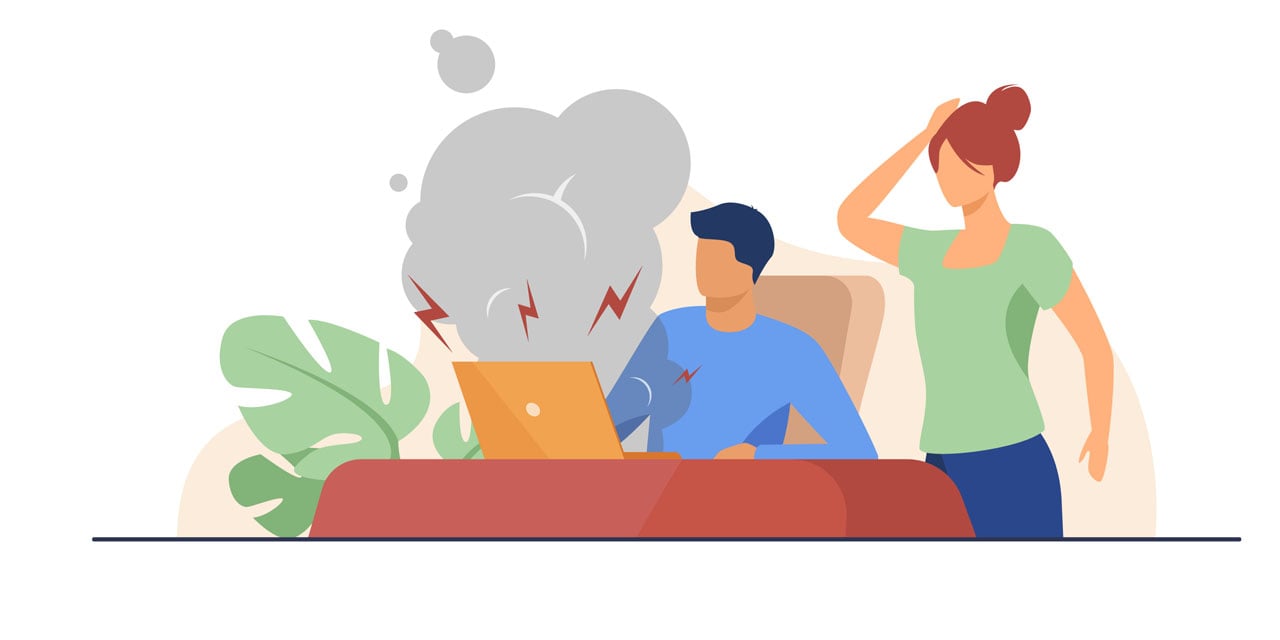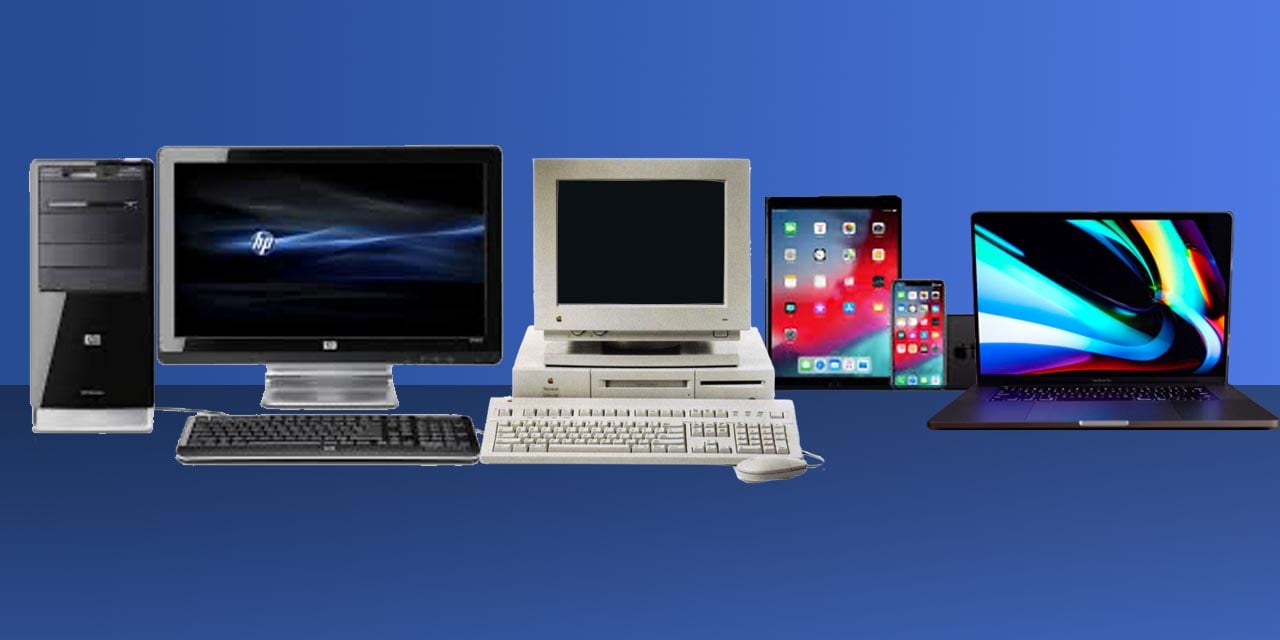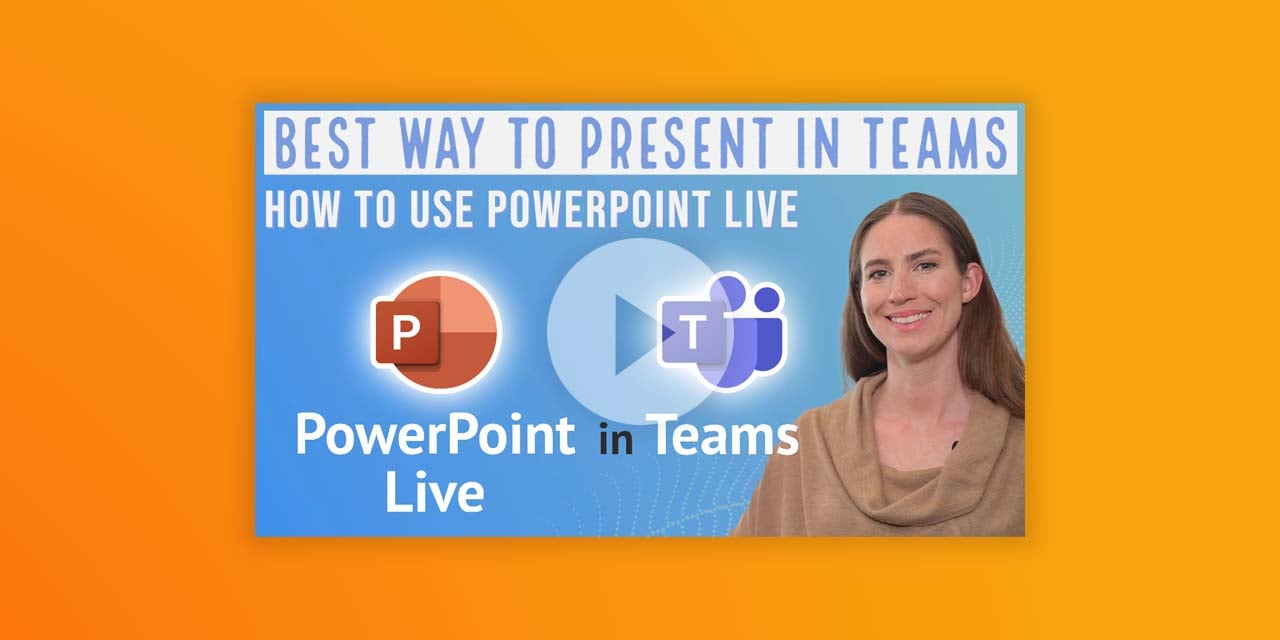2 min read
Erasing data from computers, tablets or phones
Selling, donating or recycling laptops and other devices Whether you are looking to donate, sell or recycle an old computer, laptop, tablet or phone,...

The trigger to buy a new PC or laptop is pretty simple most of the time – when it stops switching on!
However, there are tell-tail signs when your computer needs an upgrade. Understand the best time to buy or invest in a new computer and replace an old PC or laptop.
It’s important to remember that a laptop or PC should:
Our guide is based on these two fundamental principles. If your computer hits any one of the criteria below, then it’s time to upgrade:
We will also cover:
How often you should replace a computer?
Pros and cons of buying a new PC or laptop

The majority of businesses use Microsoft Windows as their operating system, with Apple macOS being second most popular. An operating system is the most important software that runs on a computer. Each operating system has various versions and updates and we always recommend implementing automated security updates to your operating system, to keep your data secure.
As of January 2020, Microsoft stopped supporting Windows 7 operating system, no longer providing support or patches/security updates. Without vital security updates, the unpatched computer could be the gateway into your entire technology infrastructure. If you consider that updates are made every month, you can see how your vulnerability to a cyber-attack can also increase over time.
Older laptops and computers can not be upgraded to newer versions of Windows, and this is where the issue lies. Continuing to use old computers with Windows 7 has a number of downfalls:
This is why we highly recommend upgrading to Windows 10. If your computer can not upgrade to Windows 10, then it's time to invest in a new laptop or PC.
If your computer is no longer supported by the manufacturer, or if your support period ends soon, then we strongly advise to replace your PC or laptop. Using a device that is not supported by the manufacturer, no matter whether it is Apple, Chrome, or a Pixel/Nexus device, means it won’t receive:
Find out if specific models can still receive updates from the manufacturer. Here are the details for Apple products, Chrome, and Pixel/Nexus devices.
Does it take a long time to turn your computer on and off? Is your computer struggling to run multiple programs? Does it suddenly crash?
This is another sign that a computer is ready to be replaced. You should certainly try a few hacks to speed up your computer such as:
But failing this, you will have to choose between time lost and productivity. Let's not forget the frustration of a slow computer too, and if you are an employee, it can feel like you are not valued.
Let’s consider productivity alone. It takes 20 seconds for an average computer to switch on. When it starts taking minutes to turn on, load programs, save documents and quit applications not responding – lost time soon adds up.
Let’s do the maths. How much time is lost by a slow computer over a week, month and year? You can change these parameters to work it out for yourself:
| Time lost | Activity | Times per week |
| 5 minutes | Turning on computer | 5 days |
| 5 minutes | Load programs | 5 days |
| 5 minutes | Program crashing and rebooting | 2 days |
| 2 minutes | Saving documents | 5 days |
| 10 minutes | Lag, computer not responding to commands straight away | 5 days |
| Time lost over time | |
| Week | 2 hours |
| Month | 9 hours |
| Year | 4.5 days |
Is the PC/laptop’s fan rumbling?
Does your computer feel hot to touch?
This is another sign that your computer is coming to the end of its life. If your computer sounds like it’s about to take off, then the fan is working overtime to cool the laptop from overheating. A noisy fan combined with programs being sluggish is a sign that it’s time to look for a replacement.
As laptops and computers get old, components can become stressed, and as a result feels hot to the touch. Your computer has to work hard to cool these tired components. What you can hear is the fan fiercely fighting to cool down.
Unfortunately, a certain amount of dust is sucked in by the fan which, over time, builds up and settles to create a residue that reduces the fans effectiveness. Many cheap laptops and PCs are not designed to have fans replaced, so repair is not usually an option.
If your screen is failing or flickering, then it is likely your PC or laptop needs replacing. Most commonly caused by being dropped or smashed – the damage is normally noticeable straight away. It may be physically smashed, or nothing is appearing. Black blotches on a laptop screen can mean the screen has come away.
Screen damage is normally a symptom of a bigger issue, especially if it has been dropped. There is a good chance that buying a new laptop or PC is going to outweigh trying to remedy the symptom. Test it out for yourself – if you connect your computer to an external screen, see if purely the screen is broken or if there is more serious, irreparable damage.
This may seem an obvious one, but if you’re hitting the power button and nothing is happening, then it’s probably seen better days. However, remember to troubleshoot before jumping the gun to order a new computer.
If your computer is still failing to turn on and it is outside of warranty, then it’s time to invest in a new PC or laptop.
Repairing old machines is an option, but you will need to weigh up the cost/benefit, for example:
Buying a new computer
vs
Replacing an expensive part, such as motherboards
(+time lost during repairs)
=
Better off buying a new computer
Repairing old machines is often only a short-term fix, particularly if they are basic models. They survive, but limp along and often need more repairs as the other parts are old/ begin to fail.
For more expensive models, it can be worth getting a repair to prolong having to make another large investment. For MacBook’s and other Apple products – get in touch with Apple customer services directly to find out how much a repair would cost.
We find that PCs need replacing every 4-5 years on average. Laptops tend to be replaced more frequently, between 3-5 years. By nature, laptops are easy to move around and transport. It means they can also be dropped or left in the living room where they can be sat on or drinks can be spilt. You name it – we’ve heard all the excuses!
We would expect more expensive laptops and PCs to reach the maximum 5-year life span or slightly longer if they have been well looked after.
If an employee is working on a laptop that doesn’t allow them to do their job efficiently – it not only causes frustration, but it can make them feel undervalued.
Slow computers can be extremely frustrating, especially if you have deadlines to meet. And we have explored how time lost can soon add up over time.
The faster your PC or laptop responds, the faster you can work and complete tasks.
Securing your business’ data is a priority. Having machinery that is up to date and supported by the manufacturer will help to protect your data and prevent a cyber-attack. You will also be in good stead to pass supply chain security tests, Cyber Essential accreditation and a be eligible for a cyber insurance claim.
New laptops inevitably have a price tag. Use this guide to weigh up the advantages, disadvantages and risks. We would recommend buying a replacement PC or laptop if you hit any of the criteria mentioned in this article.
There are so many PCs on the market, it can be difficult to know what PC is best to buy. We would recommend getting in touch with your IT department or support to work out what spec you need to perform your job.
Join the Superfast community and subscribe to our newsletter for more useful IT and cybersecurity guides.

2 min read
Selling, donating or recycling laptops and other devices Whether you are looking to donate, sell or recycle an old computer, laptop, tablet or phone,...

6 min read
Today, the best way to present a PowerPoint presentation on Teams, is by using PowerPoint Live. PowerPoint Live is a professional and easy method to...

5 min read
A recent survey reported that 90% of organisations had been subject to a phishing attack. You may have heard of ‘phishing’ but do not know what is...